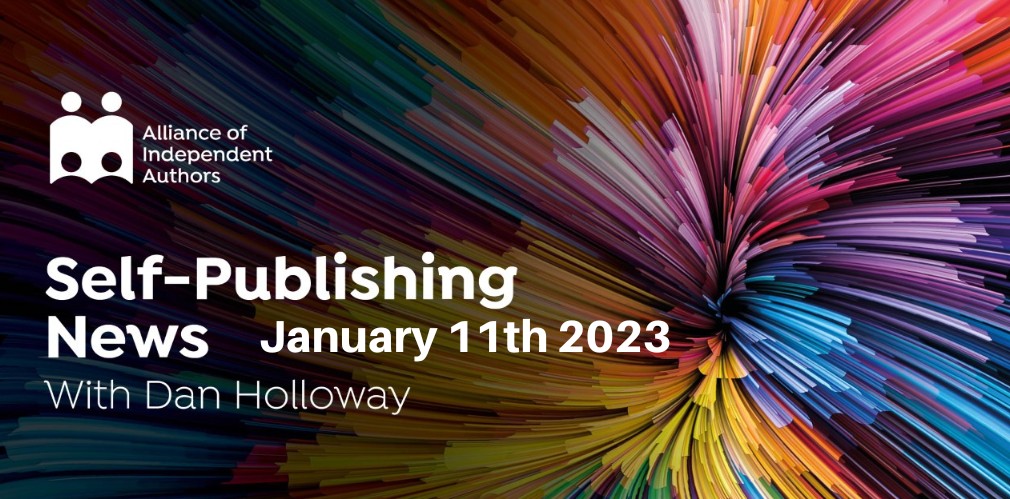In this week's Self-Publishing News Special, ALLi News Editor Dan Holloway takes a look at record digital lending figures from Overdrive and two scandals rocking the literary world.

ALLi's News Editor Dan Holloway
Do listen to November's Self-publishing News podcast here. Howard and I are talking about the question everyone's asking: should we leave Twitter and if we do, where do we go?
Bernardini Pleads Guilty to Mass Manuscript Theft
It’s a mark of how much has been in the news in the past few months that this took me by surprise. It was one of the big stories in publishing for a while, and no doubt will be again this year. Interestingly, I reported on it last almost a year ago to the day.
To refresh your memory, Filipo Bernardini was eventually discovered to be the man behind one of the most bizarre crimes in recent literary memory. For years, an anonymous person was stealing manuscripts from many of the world's leading authors, including the likes of Margaret Atwood and Ian McEwan. The individual posed as various industry insiders in order to convince publishing professionals to hand over the unpublished manuscripts. A year ago the perpetrator was revealed to be Filippo Bernardini, who had been an employee of Simon and Schuster.
This week, Bernardini entered a guilty plea to a charge of wire fraud. One of the most mysterious parts of this story is that no one knows exactly what Bernardini's motives were. He didn't do anything with the manuscripts, so far as anyone can tell, except collect them! Sadly, the guilty plea and lack of a trial means we will quite possibly never know, and it will be up to us to devise our own twist.
Overdrive Posts Record Digital Lending Figures
As if one piece of déjà vu weren’t enough, it was also this time last year that I reported Overdrive hitting half a billion library loans in 2021. Admittedly, the repeat timing is less of a surprise in this instance. It makes sense that the year’s figures would be reported at the same time. And in 2022, those figures were an even more impressive 555 million (Mark Williams tallies their own figures at an even larger 587 million – the difference seeming to be whether or not one counts the 32 million magazines as books).
The Overdrive report makes interesting reading. It lists the most downloaded titles. Colleen Hoover is there, backing up her recent acclamation as the bestselling author of 2022 (clearly lending doesn't cannibalise sales completely!). but for me the really interesting thing is the difference between the ebook and the audiobook lists. The former is all fiction. The latter contains two non-fiction titles, including James Clear's all-conquering Atomic Habits. That fits with the popularity of self-help podcasts and is useful for any of us who write non-fiction (with 4 titles coming out next year, I'd better get working on audio!).
Apple turns to AI for Audiobook Narration
Which brings us neatly to the next story. This is an interesting AI story that has broken in a Guardian piece that has attracted significant attention beyond the book world. The piece has quite a lot of flaws. I’m not convinced, for example, it understands how KDP works (it pitches Apple’s schmoozing of indie publishers – not authors – but suggests this is a shot across the bows of KDP). And I’m not sure it quite gets the complex relationship between all of Amazon’s moving parts.
That aside, though, the key part of the story is very clear. Apple has launched a collection of audiobooks solely narrated by AI-generated voices. The piece rightly points out that voice artists are worried by developments like this. It also rightly points out that Google has been very vocal about the fact it is working on something similar. I was disappointed to see that the industry reaction quoted cites the belief that AI-generated narration will never capture the magic of the human voice. That’s all well and good – until it does. At which point, if that’s the argument you’ve been using to preserve human involvement, you have nowhere to go.
It's also worth adding to the conversation that it's not just Apple, Google, and Amazon who are looking at AI narration. Spotify acquired text to speech firm Sonantic last year and we have yet to see exactly what they are going to do with that purchase.
The Indie Author Who Was Dead and then Wasn't
One story this week is so big I can’t not report on it. This weekend, it was the third most read feature on the BBC website here in the UK and it has been featured by the likes of Rolling Stone. On the other hand, I don’t really want to give it too much oxygen. So I will simply suggest that if you want to read full details, the Rolling Stone article is here. And Upstream Reviews has a long interview with the person behind the story here.
In short, and sticking to the bare facts. More than two years ago, a post seeming to come from her daughter suggested that indie author Susan Meachen had taken her own life. Parts of the writing community grouped together to help publish her last book. Other parts fell apart, with allegations of contributing to the author’s suicide. Eventually, things went silent.
This past week, Meachen revealed that she had not, in fact, died though she had, she says, been very ill. She claims she now wants her life back. She also states that she has returned to writing and her next book will feature a character everyone thinks is dead who turns out not to be. Written, she says, from her unique position of experience.
Self-publishing News: Overdrive Figures for 2022 Demonstrate Digital Popularity Share on X




